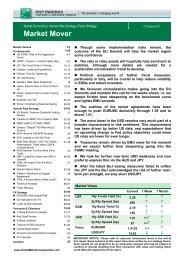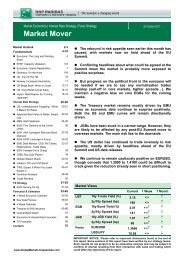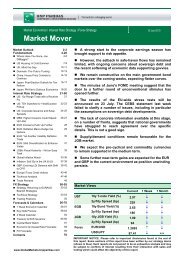Market Economics | Interest Rate Strategy - BNP PARIBAS ...
Market Economics | Interest Rate Strategy - BNP PARIBAS ...
Market Economics | Interest Rate Strategy - BNP PARIBAS ...
You also want an ePaper? Increase the reach of your titles
YUMPU automatically turns print PDFs into web optimized ePapers that Google loves.
The obvious focal point is the Summit on 4 February but on the basis of the<br />
comments from the German finance minister, amongst others, reaching an<br />
agreement by that time looks optimistic. More likely it will have to wait until<br />
March. In part, the delay reflects the differences of opinion at the national<br />
level on the proposals put forward. It also reflects the German government’s<br />
desire to secure something in exchange – a constitutional commitment to<br />
balanced budgets perhaps?<br />
More worryingly, it is also due to the tendency of the politicians to take their<br />
collective foot off the gas when markets calm down. A more effective way to<br />
bolster confidence in a lasting way would be to surprise markets positively<br />
with a swift, credible agreement when the markets are already in a positive<br />
frame of mind. We live in hope.<br />
4.5<br />
Eurozone: Pay Pressures Contained<br />
4.0<br />
Hourly Labour Costs (% y/y)<br />
3.5<br />
3.0<br />
2.5<br />
2.0<br />
1.5<br />
Negotiated Wages (% y/y)<br />
1.0<br />
Compensation per Employee (% y/y)<br />
0.5<br />
97 98 99 00 01 02 03 04 05 06 07 08 09 10<br />
Source: Reuters EcoWin Pro<br />
ECB inflation worries<br />
overdone…<br />
…given subdued pay<br />
pressures<br />
UK inflation concerns point<br />
to MPC shift<br />
JGBs in the range<br />
The level of anxiety at the ECB over upside risks to inflation has increased<br />
and the risk of an earlier start to the tightening cycle than we have forecast<br />
(from spring 2012) has risen accordingly. The ECB still expects inflation to<br />
remain in line with its definition of price stability over the medium term but it<br />
intends to monitor the risks to this scenario very closely – as will we.<br />
One of the risks to monitor is second-round effects on inflation via higher<br />
wage growth. As in December, the assessment of labour cost developments<br />
in the eurozone in this month’s ECB Monthly Bulletin was benign. To quote:<br />
“Labour cost indicators…continued to show subdued wage pressures…in<br />
line with continuously weak labour market conditions.” Growth rates in hourly<br />
labour costs and negotiated wages are both at their lowest on record. No<br />
panic required.<br />
In the UK, we expect the BoE MPC minutes next week to show increasing<br />
unease about the deterioration in inflation prospects. The MPC will have<br />
been made aware of the latest upward surprise in inflation (up to 3.7% y/y)<br />
which has reinforced our belief that inflation will exceed 4% by February –<br />
double the Bank's target. The market will look for clues as to how soon the<br />
first rate hike will be delivered. The initial focus is likely to be on whether<br />
arch hawk Andrew Sentance was joined by any other MPC members in<br />
voting for an immediate hike and to a lesser extent, whether Adam Posen<br />
has backed down in his bid to secure a second round of QE. Given the<br />
mixed picture on activity and labour market data, we suspect that the latter is<br />
more likely than the former at this stage.<br />
The JGB market continues to lack direction and 10-year yields should stay in<br />
a range of 1.1–1.3% for the time being as investors sit on the sidelines. Next<br />
week's BoJ Monetary Policy Meeting is not expected to result in any new<br />
action from the central bank.<br />
Ken Wattret 20 January 2011<br />
<strong>Market</strong> Mover<br />
3<br />
www.Global<strong>Market</strong>s.bnpparibas.com

















